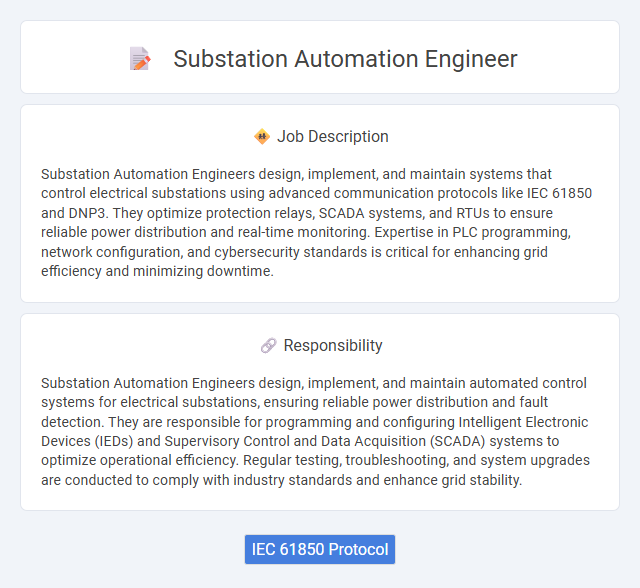
Substation Automation Engineers design, implement, and maintain systems that control electrical substations using advanced communication protocols like IEC 61850 and DNP3. They optimize protection relays, SCADA systems, and RTUs to ensure reliable power distribution and real-time monitoring. Expertise in PLC programming, network configuration, and cybersecurity standards is critical for enhancing grid efficiency and minimizing downtime.
Individuals with strong analytical skills and a keen interest in electrical systems are likely to find the role of a Substation Automation Engineer suitable and rewarding. Those who enjoy working with complex technology, troubleshooting, and implementing automated solutions may have a higher probability of success and job satisfaction in this field. Conversely, people who prefer less technical or more routine work might not find this role as fitting for their skills and preferences.
Qualification
A Substation Automation Engineer typically requires a bachelor's degree in electrical engineering or a related field, with specialized training in automation systems and SCADA technology. Proficiency in communication protocols such as IEC 61850, DNP3, and Modbus is essential, along with hands-on experience in designing, programming, and commissioning protective relays and control systems. Strong knowledge of power system operations, embedded software development, and network security ensures effective implementation and maintenance of automated substation equipment.
Responsibility
Substation Automation Engineers design, implement, and maintain automated control systems for electrical substations, ensuring reliable power distribution and fault detection. They are responsible for programming and configuring Intelligent Electronic Devices (IEDs) and Supervisory Control and Data Acquisition (SCADA) systems to optimize operational efficiency. Regular testing, troubleshooting, and system upgrades are conducted to comply with industry standards and enhance grid stability.
Benefit
Substation Automation Engineer roles likely offer significant benefits such as improved operational efficiency and enhanced system reliability through advanced monitoring and control technologies. The position probably provides opportunities for professional growth due to exposure to cutting-edge automation systems and integration techniques. Engineers in this field may also benefit from competitive compensation and the potential for work in diverse environments ranging from utility companies to industrial facilities.
Challenge
The role of a Substation Automation Engineer likely involves addressing complex challenges related to integrating advanced communication protocols and ensuring system reliability within electrical substations. Troubleshooting automation systems and managing real-time data exchange may present ongoing difficulties requiring innovative solutions. The probability of encountering evolving technological standards and cybersecurity concerns suggests a dynamic work environment demanding continuous learning.
Career Advancement
Substation Automation Engineers specializing in electrical grid systems leverage expertise in SCADA, IEC 61850, and protective relaying to optimize power distribution networks. Mastery in integrating Intelligent Electronic Devices (IEDs) and implementing real-time monitoring enhances operational efficiency and reliability, positioning professionals for leadership roles in smart grid projects. Advancing to senior engineering or project management roles often requires proficiency in cybersecurity protocols, system integration, and cross-disciplinary collaboration within utility companies.
Key Terms
IEC 61850 Protocol
A Substation Automation Engineer specializing in IEC 61850 protocol designs and implements communication networks for intelligent electronic devices (IEDs) in electrical substations, ensuring interoperability and real-time data exchange. Expertise in configuring MMS, GOOSE messaging, and SV communication protocols enhances the protection, control, and monitoring systems within smart grids. Proficient in system integration, testing, and troubleshooting of IEC 61850-based automation solutions increases operational efficiency and reliability of power distribution networks.
 kuljobs.com
kuljobs.com